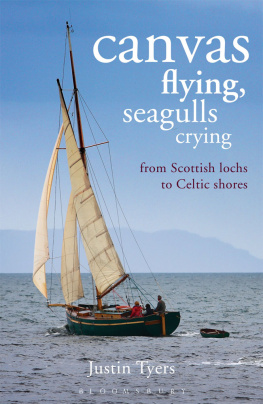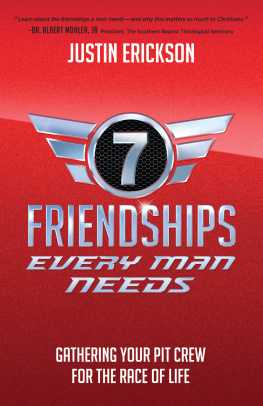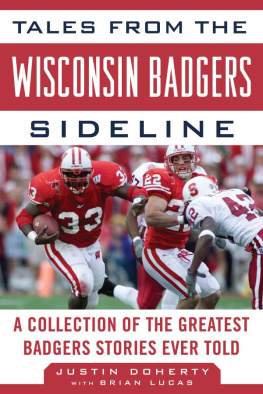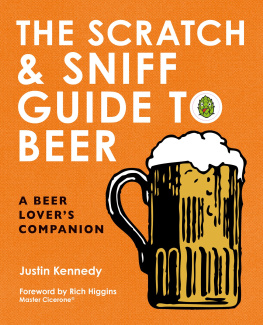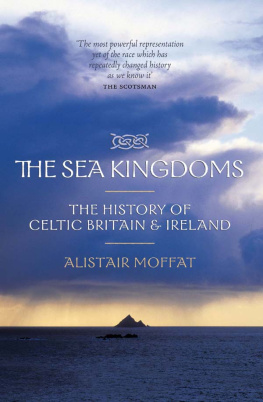All illustrations are by the author. These and further examples of his work can be ordered at www.justintyers.co.uk
Justin likes to hear from readers particularly where on the planet they are, how they heard of the book, and what they did and didnt get out of it. Please get in touch at:

NOT TO BE USED FOR NAVIGATION
EVERYONE YOU MEET IN THE WILDERNESS is going to be odd you just have to accept that. What would any normal person be doing out here?
Wed arrived by boat our boat, which is also our home. Even experienced mariners would find the rocks which guard the entrance to Inner Loch Tarbert on the Scottish island of Jura discouraging. Linda and I only narrowly avoided wrecking ourselves.
Most of the rocks are hidden just below the surface, scattered about at the point where the loch is narrowest, so if you wish to pass through to the quiet waters beyond you have to run their gauntlet, theres no giving them a wide berth. And just to add spice to the tricky navigation the loch is like a river that runs fast in both directions six hours in, six hours out.
As we approached we found ourselves carried in by a tidal stream which was if anything too obliging. It was literally falling over itself to help us on our way. And not only that but explosions of wind were being prepared for us high in the mountains to our right, and hurled down at us whenever it looked as though we might be losing speed. The Almanac warned us that these explosions were a local phenomenon whenever the wind was strong, and in the south. It gets corralled by an unseen hand high up in the mountains and when too much has been gathered together, a gate is broken and the whole lot stampedes downhill to arrive across the decks of boaters at a full gallop.
Our own boat is a self-built version of those lovely old coastal craft you sea in oil paintings from the 1800s; she carries over a 1,100ft of canvas (100 sq m) and although she enjoys a bit of wind as much as the next boat, too much of it sends her into a frenzy. Invariably, when one of those parcels of wind was hurled down at us wed be at a tricky bit, lost, nervously scanning the chart and looking around in vain to confirm our position. We wanted to stop, pause for breath, take stock of things, and establish where exactly amongst the litter of chart symbols we were but what with the tide under us, and the wind screaming through the rigging, we were driven on through the kelpie rocks at a helluva pace; forcing the tiller this way and then that, following a hunch... then changing our minds when a head of rock slowly emerged in front of us.
Linda screamed its her way of letting me know that shes not happy. A moment later her scream echoed back to us. Startled, we turned to see who else was in trouble.
Because the rocks are unmarked, on the hills surrounding them half-buried in fern which grows to head-height islanders maintain three transits as an aid to navigation. Every couple of years they drive across the wilderness on quads carrying tins of white paint to refresh pairs of stones fortuitously placed by nature which, viewed in line, guide mariners along a zigzag course through the rocks below. Its difficult to pick these painted stones out at first amid the grand scenery which rolls into the distance all around. Sometimes they will be on the hill ahead of you, and sometimes the one behind meaning you have to turn and face backwards whilst guiding your ship ahead and youll have to monitor two pairs at once one lot so that you dont wander from the course youre actually on, and the second lot to see when they come into line. Because when they do, its time to turn. Now. Without a moment to lose.
Suddenly the loch opened out and the water became placid. That we emerged the other side of those dangers was mere luck; we pressed on and, following our progress with a finger on the chart, felt our way in to the upper reaches of the Loch. The further in we went the more the wind was tamed by the twists and turns we took around nooks and crannies of land.
We slipped through a naturally-formed canal which was so narrow you could have stepped off the deck and onto a rocky shelf on either side. A goat with his back to us grazing on herbs growing from cracks in the rocks thought he heard something. He lifted his head, throwing a fine set of horns into the air, then stood operating his lower jaw. Suddenly he noticed a gaff-rigged yacht behind him. His hooves slid as he galloped on the spot on hard rock. Then they found some traction, and he bolted for cover into a thicket of silver birch. We turned too late on the next corner, touched a table rock on the sea bed, and heard the metal shoe which protects our long keel scrape as we slid off it again, harmlessly.
There was some confusion over which side to pass a midstream rock right ahead of us then moments later we drifted into a pool which was worth ten-times the drama of reaching it. Down went our anchor into clear water like brown glass. The clanking of our chain came back to us from the hills which surrounded us. After that it was so quiet we could hear the chain drip.
We unbent ourselves from our adventure and stood without speaking to see what wed come to. Language is not powerful enough to describe the silence. Its one thing to stand in an empty and quiet room, but to be able to see hills rising and falling one behind the other, losing themselves in the vague distance of miles, and yet still hear nothing is baffling you quite literally cant believe your ears. We whispered.
Will we be all right here?
Yes... perfect.
Wed been living on board for four years. We could scarcely believe it ourselves. Four years idly drifting along the Celtic shores of Scotland, Ireland, France and Cornwall; nosing about in historic fishing harbours, or quietly carrying out our daily chores in deserted anchorages; wandering ashore to meet the quirky characters who inhabit the windy seafronts, getting on nodding terms with the shadowy figures who lurked at the pier-head, and sometimes falling into the open arms of self-appointed ambassadors for the area who wanted us to know what an honour we were doing them simply by bringing our rakish-looking craft into their harbour.
Celtic Cross
Living on board, summer and winter, browsing the low water shore, felling wood for our fire, and planning our next journey, we felt as though wed pulled into some lay-by in life whilst the helter-skelter madness of the world passed by. Our contented days were filled over-filled, really with purpose and the busyness of self sufficiency.
We were coming to the end of a thrilling summer during which wed spent our time around the Hebrides, veering off the well-beaten sailing-tracks to try and gain some of the

